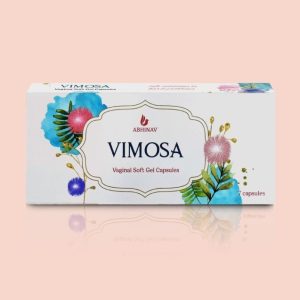

Vaginal dryness and inflammation are common issues women face, especially during and after menopause. It can cause discomfort and pain during intercourse and increase the risk of infection. While medical treatments are available, Ayurveda offers a natural solution for vaginal dryness that effectively addresses these issues without side effects. Let us find the best remedies for vaginal dryness and inflammation using Ayurveda.
Understanding Vaginal Dryness and Inflammation
The lack of moisture in the vaginal walls causes vaginal dryness. It is often accompanied by itching, burning, and irritation. It happens for various reasons, such as menopause, breastfeeding, certain medications, or autoimmune disorders. Inflammation, on the other hand, is caused by an infection or an allergic reaction. It can cause pain, swelling, and redness in the vaginal area.
Ayurvedic Remedies for Vaginal Dryness and Inflammation
Ayurveda considers vaginal dryness and inflammation as a result of an imbalance in the doshas, namely Vata and Pitta. The following remedies can help in balancing the doshas and restoring the moisture and health of the vaginal walls.
Yashtimadhu:
Yashtimadhu, also known as licorice root, is an Ayurvedic herb that has been used for centuries to treat various health problems. It is known for its anti-inflammatory and antioxidant properties, which can help soothe vaginal tissues and prevent infections. You can consume Yashtimadhu in the form of tea or take it as a supplement.
Cow Milk:
Cow milk is a rich source of calcium, which is essential for maintaining healthy vaginal tissues. Drinking a glass of warm cow milk every day can help prevent vaginal dryness and inflammation. Cow milk can also be used as a topical treatment to soothe vaginal tissues.
Lajalu:
Lajalu is an herb that has been traditionally used in Ayurveda to treat vaginal dryness and inflammation. It contains phytoestrogens that can help balance the hormonal levels in the body, thereby reducing vaginal dryness. Additionally, it has anti-inflammatory and antimicrobial properties that can help alleviate inflammation and prevent infections. You can consume Lajalu in the form of tea or take it as a supplement.
Coconut Oil
Rich in medium-chain fatty acids that have antimicrobial properties. It can help in preventing infections and also moisturize the vaginal walls. Apply a small amount of coconut oil inside the vagina and on the vulva.
Bala
Bala is an Ayurvedic herb that has been used to treat a variety of gynecological problems. It is known for its anti-inflammatory, analgesic, and rejuvenating properties. Bala can be taken internally or used as a topical treatment to reduce vaginal inflammation and irritation.
Shatavari
Shatavari is an herb that is known for its rejuvenating properties. It can help restore the hormonal balance in the body and improve vaginal lubrication. Mix a teaspoon of Shatavari powder with a glass of warm milk. Drink this every night before bed.
Ashwagandha
Ashwagandha is a powerful adaptogen that can help regulate the body’s stress response. It is also known for its anti-inflammatory and antioxidant properties, which can help reduce inflammation in the vaginal tissues. Ashwagandha can be consumed as a supplement or taken in the form of tea.
Yoga and Meditation
Stress can also be a contributing factor to vaginal dryness and inflammation. Practicing yoga and meditation can help in reducing stress and improve overall health. Certain yoga poses as the butterfly, cobra, and fish pose can also help improve blood flow to the pelvic area and stimulate the reproductive organs.
Sesame Oil
Sesame oil is a popular Ayurvedic remedy for vaginal dryness. It has natural lubricating properties that can help to moisturize and soothe vaginal tissues. Warm sesame oil slightly and apply it to the vaginal area before going to bed. Add a few drops of sesame oil in water while bathing to help soothe the vaginal area.
Proper Hydration
Proper hydration is essential for maintaining healthy vaginal tissues. Drink a lot of water daily to keep your body hydrated. You can also try drinking herbal teas known for their hydrating properties, such as chamomile or peppermint tea.
In conclusion, Ayurveda offers several natural solutions for vaginal dryness and inflammation that are safe and effective. By following these natural remedies and lifestyle changes into your daily routine, you can help to maintain healthy vaginal tissues and alleviate discomfort associated with vaginal dryness. For all of your product-related queries or general inquiries, mail us at abhinavhealth@gmail.com or call us at 022 2634 7701.




Add comment
You must be logged in to post a comment.